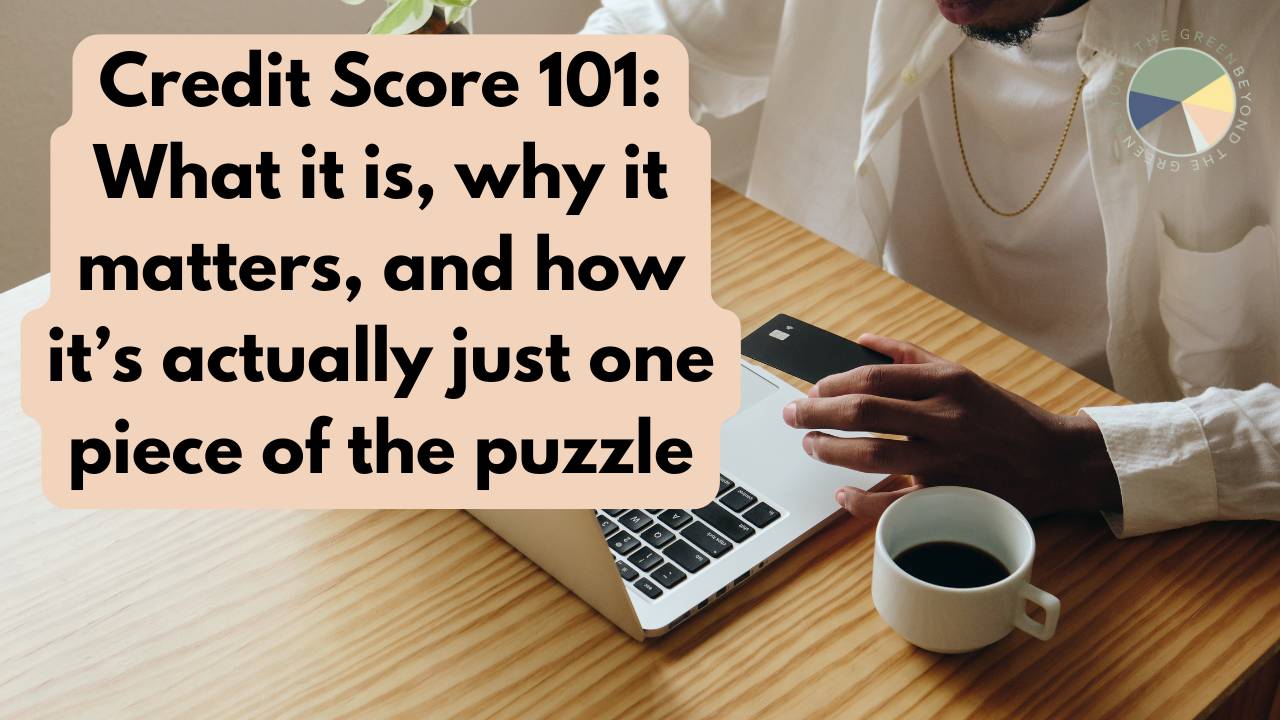Credit Score 101: what it is, why it matters, and how it’s actually just one piece of the puzzle
Jun 11, 2025
Credit Score 101
Let’s get something out of the way real quick: your credit score is not the holy grail of financial wellness.
People get really emotional about this number. They track it like it’s their weight the week before a wedding, tying their self-worth to a three-digit code. But your credit score doesn’t necessarily mean you're good with money… and it definitely doesn’t mean you’re bad with it either.
Your credit score is just a number, like many other numbers in your life, and it only represents one piece of the puzzle. While your credit score has validity and it's important in some ways, it is definitely not the most important thing; we need to be looking at your financial health in a holistic way, not putting too much weight on one thing or another.
Still, it helps to understand what this number actually is and why it shows up all over your life. So let’s dive in.
What Is a Credit Score?
Your credit score is a number (usually between 300 and 850) that lenders use to evaluate how likely you are to repay debt. It's created from your credit history, which is tracked by three major bureaus: Equifax, TransUnion, and Experian.
These bureaus look at things like
- How long you’ve had credit (length of credit history)
- Whether you pay your debts off on time (i.e., are you accumulating late payments?)
- How much available credit you’re using (a.k.a., credit-to-debt utilization)
- How much debt you have compared to your income (debt-to-income ratio)
- If you’ve recently applied for a new credit line
- What types of credit you have (credit cards, loans, mortgage, etc.)
And all of these different aspects go into creating your credit score.
Essentially, these bureaus collect and input all of your credit data over your lifespan into their databases. Now, depending on what Equifax, Experian, and TransUnion value, they’re going to make certain things more important than others. For example, Equifax might prioritize your credit-to-debt utilization, while TransUnion might weigh late payments more heavily. That’s why when you check your score on something like Credit Karma, you’ll often see two different numbers—because each bureau is looking at your history through a slightly different lens.
Here’s where FICO comes in. Your FICO score—used by 90% of lenders—pulls a little bit from Equifax, Experian, and TransUnion. It takes all that data, runs a simulation, and spits out one number. That’s why you hear “FICO, FICO, FICO” all over the credit score world—it gives the most holistic view of your credit & debt repayment behavior and is the one most banks, landlords, and loan officers are paying attention to.
Why Does Your Credit Score Matter?
It doesn’t define your worth (how many times can I say it?!), but your credit score does affect:
- Whether you can get approved for an apartment
- The interest rate on a car loan or mortgage
- Your ability to open new credit cards or personal loans
- How much new credit you are approved for
And here’s the kicker: you can have an 800+ credit score (an excellent score, in other words) and still be drowning in debt. Credit scores are designed to track how well you manage borrowed money, not how much you save or whether you’re debt-free. You can have a sky-high score and still be deep in credit card debt because the system favors consistent repayment over actual, holistic financial health.
So yes, your credit score matters. But again, it’s just one piece of the puzzle, not the whole financial picture.
What Is It Used For?
Here's where it might come up in real life:
- Applying for housing—landlords check it to see if you're “financially responsible” (which, as we just learned, your credit score doesn’t necessarily determine!). But they also look at income, job history, and sometimes just ask for more months’ rent upfront if your score is lower.
- Financing a car—You can still get approved with a low score, but you’ll likely pay a higher interest rate.
- Getting a credit card or loan—approval and terms depend on your score.
- Buying a home—Similar to a car loan, a higher score means better mortgage rates. A lower score? Still doable, but it may cost more over time.
- Utilities and phone plans—They may check your credit, but it won’t affect your score unless you stop paying.
- Some jobs—Especially in financial services or government roles—may check your credit to assess the risk in bringing you onto the team.
Don’t Lose Sleep Over This
Please, please, please. Your credit score is not your report card. It’s not your GPA. And it definitely does NOT define your worth.
A strong score can help lower your interest rates. But I’d rather you have no bad debt, $10K in savings, and a 670 credit score than be maxed out across five cards with an “exceptional” score of 820.
Focus on what matters: paying your bills on time, automating payments, building savings, and creating a life you’re proud of. The credit score will follow. Mine sure did. When I started getting my financial shit together, my score was in the 500s. I didn’t focus on raising my credit score at all. Instead, I focused on budgeting, paying down my debt in a sustainable way, and balancing out my income streams. Now, my credit score is well over 800, and I just bought my 3rd property.
You can do it too. Want help creating a strategy to actually improve your credit, pay off debt, and start building wealth?
Beyond The Basics: Our Glossary Of Financial Terms
We define the lingo you'll need to become a finance expert!
We hate SPAM. We will never sell your information, for any reason.




